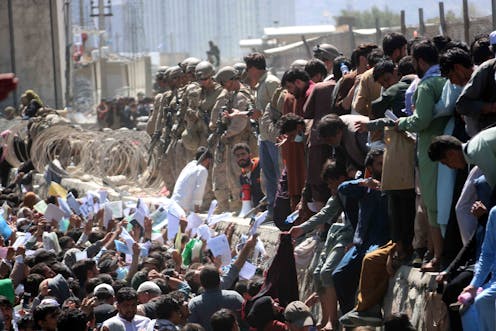Source: The Conversation (Au and NZ) – By Mary Anne Kenny, Associate Professor, School of Law, Murdoch University

Akhter Gulfam/EPA/AAP
The situation in Afghanistan is rapidly unfolding as a humanitarian crisis. We are seeing images and stories of violence and despair on a daily, sometimes even an hourly basis.
If you are looking at practical ways to help, here are some suggestions to support refugees from Afghanistan locally, nationally, and internationally.
Show your support for policy change
One option is to support what many Australians from Afghanistan are calling for.
The Afghan Australian Advocacy Network, made up of a diverse range of ethnic and religious groups from Afghanistan, wants the federal government to increase our humanitarian intake, grant permanent protection to people from Afghanistan in Australia on temporary visas and prioritise family reunions.
An easy first step is to support and share the Afghan Australian Advocacy Network’s petition, which currently has more than 140,000 signatures.
Another option is to write to federal members of parliament and ask them to support of these actions. When you write to your local federal MP, ask to meet with them to discuss your concerns.
Approach your state, territory and local governments. Ask them to demonstrate acts of solidarity such as providing additional quarantine places, follow the South Australian parliament’s lead to pass a motion supporting refugees from Afghanistan or lighting up public buildings.
Donate or volunteer
There are many local, national and international organisations working with refugee communities from Afghanistan.
While many people want to donate goods, most agencies prefer a financial donation as agencies are able to work with communities and find out what they need.
War artist Ben Quilty has taken matters into his own hands, and is appealing for funds for the United Nations High Commissioner for Refugees (UNHCR).
Apart from the UNHCR, some other established organisations supplying practical things like food, water and supplies in Afghanistan are the Australian Red Cross and UNICEF Australia.
The Emergency Action Alliance is also running a crisis response for Afghanistan. This group is made up of 16 Australian-based charities, including Oxfam, World Vision and Save the Children.
People in each state can donate or volunteer with local organisations to support their work with refugees.
This includes:
- NSW: the Asylum Seekers Centre and Jesuit Refugee Service
- Victoria: Asylum Seeker Resource Centre
- Western Australia: Coalition Assisting Refugees and Detainees
- South Australia Welcoming Australia
- Queensland: Multicultural Australia and Romero Centre
- ACT: Companion House
- Tasmania: Multicultural Resource Centre
- Northern Territory: Melaluca Centre
Help for refugees in the community
If you or someone you know is seeking information for their family or friends in difficulty in Afghanistan, their priority will be trying to access legal advice or assistance.
The Asylum Seeker Resource Centre has a list of legal resources. Refugee Legal in Melbourne also have a hotline for people impacted by the crisis in Afghanistan.
Read more:
There’s a way to get refugees out of Afghanistan after this week’s deadline — if the Taliban agrees
Foundation House (a Victorian organisation for torture survivors) has basic information about visas and mental health support in English and Dari. The Refugee Council of Australia has a comprehensive list of services, including legal and financial support to refugees, all around Australia.
Legal services, advocates and advisers are experiencing a huge increase in demand and are working at capacity. So, another practical way you can help here is to donate to a refugee community legal centre in your state or territory.
How to provide emotional support
People from refugee backgrounds are likely to be highly distressed by the crisis in Afghanistan. Distress can come and go in waves.
The Australian Torture and Trauma network has useful tips on how to respond in a compassion first, trauma-informed way. This includes: listening and acknowledging feelings, resisting the urge to offer quick solutions and encouraging people to take breaks from the media coverage.
For teachers supporting students and families from refugee backgrounds, Foundation House has a video to support students and families of Afghan backgrounds.
Own a business? Sponsor a refugee
An organisation called Talent Beyond Boundaries helps connect businesses to people with skills who are displaced.
It uses visa programs in Australia, Canada and the United Kingdom to help employers gain a talented refugee while also bringing them to safety.
Employers can get in touch direct and the organisation also takes tax-deductible donations.
![]()
Mary Anne Kenny is a member of the WA Refugees and People Seeking Asylum Network.
Ali Reza is Board of Director at Community Refugee Sponsorship Australia and a volunteer Partnership Coordinator with Indigo Foundation Australia.
Caroline Fleay is a member of the WA Refugee and People Seeking Asylum Network.
Nicholas Procter receives funding from Overseas Services to Survivors of Torture and Trauma.
– ref. The situation in Afghanistan is beyond horrifying: this is what you can do to help – https://theconversation.com/the-situation-in-afghanistan-is-beyond-horrifying-this-is-what-you-can-do-to-help-166816




